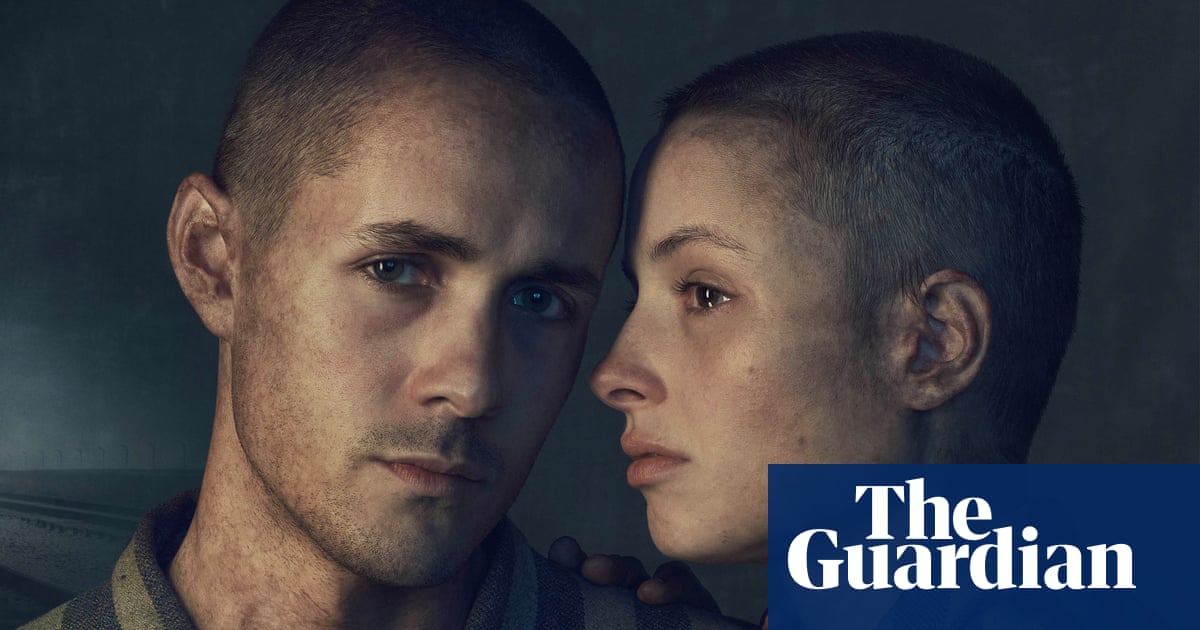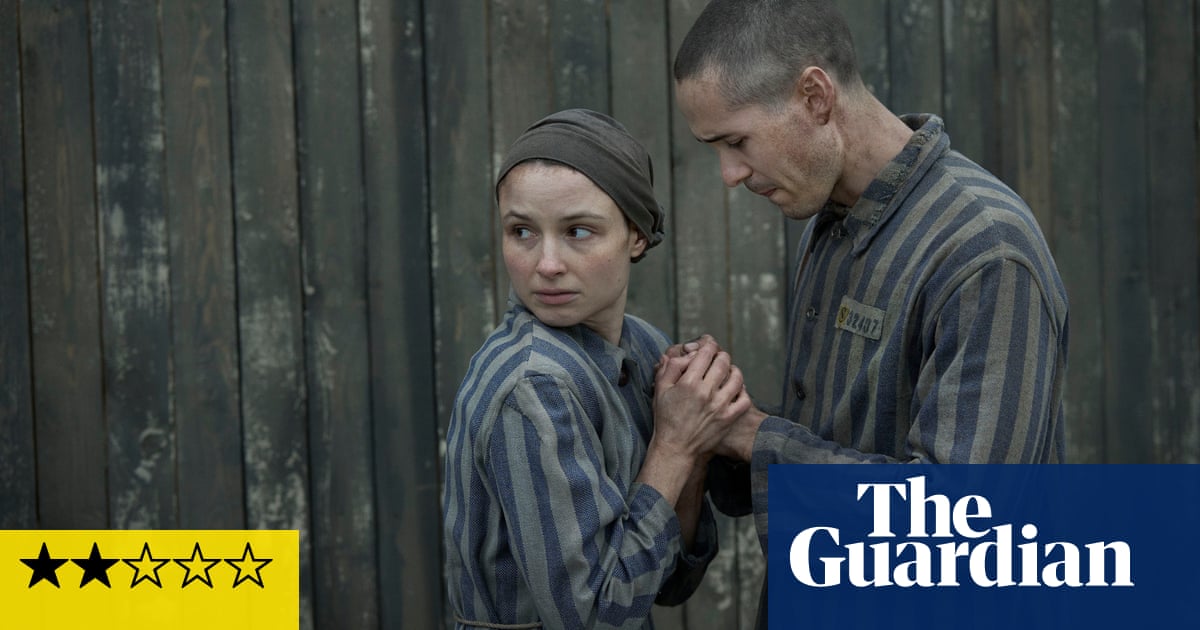
It’s not every day that I meet a real-life Disney prince. It’s even more discombobulating when he tells me he spent the weekend cheering on Clapton CFC women’s team in windy east London. “Before The Little Mermaid, a lot of people told me, ‘This is going to happen! That is going to happen!’” says Jonah Hauer-King, who starred as Prince Eric in last year’s remake. “It’s just really not the case. I wouldn’t say my life has changed much. Honestly.” It’s probably about to, though. Massively.
The 28-year-old lifelong Londoner is sharply suited and booted in the capital’s Corinthia hotel, ready to take on a full day of press with the poise and charm that clearly helped him bag that wide-eyed royal part (he even convincingly claims that these interviews are worth missing his beloved Arsenal’s Champions League game in the evening for). His next project, however, is a world away from Disney dreams.
The Tattooist of Auschwitz is Sky’s epic drama taken from Heather Morris’s bestselling 2018 novel. The book is based on the real story of Lali Sokolov (Hauer-King), a Slovakian Jew who is given the job of tattooing numbers on to fellow prisoners in the Auschwitz-Birkenau concentration camp. He tattoos and falls in love with Gita Furman (Anna Próchniak), and they both manage to survive and find each other again.
It is a harrowing and deeply upsetting watch. And yet there are rare, precious moments of hope in its love story. Hauer-King, an early fan of the book, spent hours speaking with executive producer Claire Mundell to ensure the story was in a respectful and protective pair of hands.
“The first thing I did was go back to Auschwitz [he first visited it as a teenager], to pay my respects and approach it as an adult,” he says of his year-long deep research. “But also to approach it more in the context of the story we were telling.”
The three-month shoot in Slovakia was tough. “It was always going to be quite draining,” says Hauer-King. The most shocking moment came when many of the cast had to shave off their hair. “In any other context, it can be quite an innocuous thing to do – it’s sort of just a haircut,” he says. “But knowing why they shaved people’s heads, why they wanted to dehumanise people and take away their identity … Having been something I was quite matter-of-fact about, when I actually came to do it and saw myself in the mirror, it was so poignant. I wasn’t expecting that.”
Despite its global success, the story received criticism regarding its authenticity: the Auschwitz Memorial Research Centre claimed that numerous historical details of the camp are wrong. Morris has always said that the book, based on months of interviews with 87-year-old Lali in 2003, isn’t an academic piece of non-fiction, and says “95% of it is as it happened, researched and confirmed”. It is Lali’s story, she told the New York Times: “I make mention of history and memory waltzing together and straining to part, it must be accepted after 60 years this can happen but I am confident of Lali’s telling of his story, only he could tell it and others may have a different understanding of that time but that is their understanding, I have written Lali’s.”
In the series, this is addressed by having Morris (Melanie Lynskey) meet and speak to the older Lali (Harvey Keitel), who tells his story through flashbacks. Hauer-King says that Morris, who executive produces on the show, was very open to taking the novel as a blueprint and doing more research on every point of the story. Still, does he worry about a similar backlash?
“Yeah definitely,” he is quick to answer. “When you tell a story like that, on the one hand you want to make sure that everything is being done to ensure authenticity. On the other hand, we were aware that we’re not trying to tell a definitive story of the Holocaust and it is definitely one man’s story.”
The timing of such a show is another contentious point. When journalists were first invited to watch clips of the drama in a London hotel last November, Israeli director Tali Shalom Ezer joined over video as she couldn’t fly because of the crisis in the Middle East. Jonathan Glazer’s recent Oscar-winning Auschwitz film The Zone of Interest proved how powerful screen stories are in provoking uncomfortable but essential discourse on current conflicts. Hauer-King agrees: “That’s so important. They really have a significant part to play. I don’t think they’re there to replace other mediums like documentary.”
Still, there is a baffling moment when I mention that he signed an Artists for Palestine UK open letter alongside Tilda Swinton, Charles Dance and Steve Coogan, calling for a Gaza ceasefire last October. “Oh actually, I haven’t. I didn’t know about that,” he says in surprise. “Tell me about the letter.” He adds: “That’s not to say that I wouldn’t have [signed it], but no I don’t think I have.” (His name still appears on the list at the time of writing and his team have since declined to add further comment on record.)
Hauer-King has a remarkable family history – his Jewish grandparents fled Poland for Canada between the wars in 1929. “They went on the SS Lituania, which took you across the Atlantic to Halifax,” he says excitedly. “We recently found all of the records and photographs of [my grandad]. It is an extraordinary story. His grandparents, who he didn’t come with, had been sending letters intermittently for years … and then they just stopped.”
The influence of this is strong. Fans of the brilliant drama World on Fire will recognise Hauer-King as Harry Chace – a young translator who finds himself in a love triangle when he is sent to Poland. He also starred with Clive Owen and Tim Roth in François Girard’s adaptation of The Song of Names, following a Polish orphan after the second world war. “Identity and who we are, where we come from and our past history through family – it’s something I’ve always been really fascinated by,” he says. When he told his mother about the role of Lali, she had mixed feelings: “She felt very proud that I was making something that felt really meaningful, but also shared my feeling of how important it was to take care of this story and what a responsibility it was.”
Hauer-King grew up in Camden; his mother, Debra Hauer, was a theatre producer and his restaurateur father, Jeremy King, co-owned the company behind the Wolseley. He originally wanted to be an indie rock star, playing guitar in a band called Rova. “It was probably the happiest days of my life, gigging around north London venues like the Lexington,” he laughs. Were they any good? “I always say: ‘Oh, we were rubbish.’ But then I think I’m just saying that … I was proud of it at the time!”
He went to Eton and studied theology and religious studies at Cambridge University, but then pursued acting as a career. The dominance of the privately educated in the arts looms large, but he is refreshingly up for talking about it with total acceptance. “I was at a school where drama was taken so seriously – you were literally given a stage. I was allowed to explore that. And that was where I fell in love with it. I think you need to own it and put your hands up and say: ‘This is a very real problem and this is something you have benefited from.’ To deny that you’ve been given a huge leg up? It could be quite insulting.”
This formative privilege may explain why he seems so grounded and unchanged as he breaks Hollywood and launches one of the biggest dramas of the year. He still lives in Camden and would never move to Los Angeles. “A lot of my friends aren’t actors; when you’re here, you’re surrounded by a million people doing different things and I really like that,” he says. “London for me still represents home away from work. I wonder if the lines would be blurred a bit more in somewhere like LA.”
Plus, he’s got that football season ticket to make the most of. Although, he says: “When I was filming Tattooist, one way I tried to take myself away from the shoot was to watch Arsenal. It was this time last year, when I was confident they’d do it [win the Premier League], but it started going downhill. Now I’m much more hands off. I’m not going to make any bold statements.”
Right now, he has the Tattooist premiere to attend, where he will meet his co-stars Keitel and Lynskey for the first time. “The realities of filming production and scheduling meant I didn’t [meet them], which was devastating. I love them both so much! And now I’ve watched it and they are both extraordinary in it.”
Hauer-King is a busy man after that. He stars as Giacomo Casanova in upcoming film A Beautiful Imperfection, which centres on Casanova’s great love, Lucia. He’s also filming Doctor Who next month (he is very tight-lipped on any details) and reading a lot of scripts so he can pick his next project wisely. But his Disney days are firmly behind him.
“The Little Mermaid was really different to anything I’ve ever done. There was so much going on around you; our director called it the circus. You can’t believe the scale of it when you walk on the sets – a rainforest set, a boat set, or flying to Sardinia and being on a beach,” he says. “But I’ve just made another film where you walk on set and it’s a living room … It would feel restrictive to do the exact same kind of thing again.”
“When you do a job like Tattooist, you know not every job is going to feel that meaningful,” he says. “But you also realise how incredible a job it can be, if you wait for the right one to come along.”












